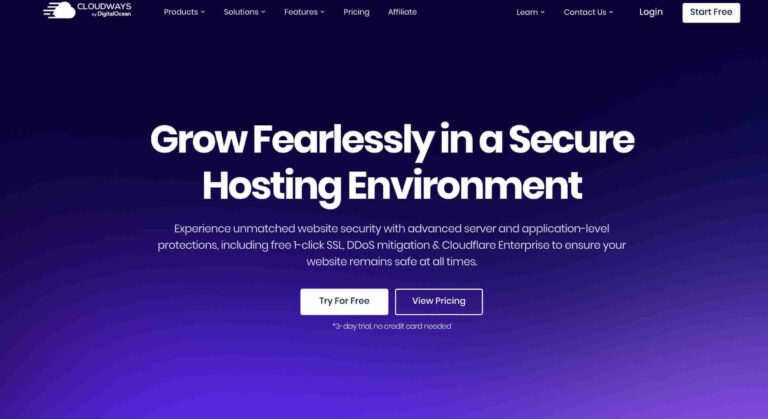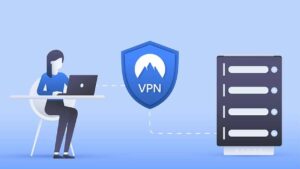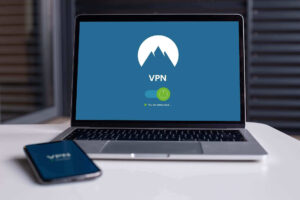How Cloudways Hosting Keeps Your Website Secure

Cloud security is an approach to defending cloud-based infrastructure, data, and applications. It comprises technologies and procedures, of which most website owners should be aware.
Cloudways offers a range of server security measures to help keep your site safe from harm. These are usually not available on standard infrastructure providers or traditional hosting companies. You would normally pay extra for these features, but they are all included as part of your Cloudways subscription.
We will go through these security features in this blog post, to see why they are important and how Cloudways helps your business by including them in their offer.
Note: You can try Cloudways for 3 days for free, no credit card is required.
Why Is Server Security Important?
Those new to running a website might wonder why they need to bother themselves about cloud security. There seems to be no need for that – until a hacker says hello.
There are many reasons to concern yourself with your server’s security. They include so many potential threats such as data exposure, unauthorized access, malware infection, a DDoS attack, and access control issues.
Let’s take a closer look at each of these terms to better understand what they mean:
- Data Exposure: If you are just running a hobby website or blog, then you might not have much to worry about data exposure. But consider a situation, where you store sensitive client information on your website (such as passwords, banking information, and personally identifiable data). In such a scenario, having those client data exposed on the Internet can be risky. There are many possible causes of data exposure, including server misconfiguration, human error, and poor security measures.
- Unauthorized Access: Unauthorized access to your server occurs when a bad actor gains a connection and control of your system. This is usually referred to as hacking and the bad actor, the hacker. There are many reasons why a hacker will want access to your system, such as stealing your passwords and confidential information, installing a botnet on your server, or simply locking you out and demanding a ransom. Unauthorized access attacks are usually caused by weak security measures (such as a weak “1234” password) and platform vulnerabilities.
- Malware Infection: A malware infection is a very serious issue for any website. Malware here refers to any software application that is used to cause harm. This includes scripts that sit on your server and steal information, botnets that damage other sites, ransomware that hijack your system until you pay up, linking, and cross-site scripting. Although malware tends to target specific CMSs like WordPress or older, un-updated software platforms with one security vulnerability or the other, malware can attack almost any platform. In fact, a malware application is only as good as its designer.
- DDoS Attack: A DDoS or Distributed Denial of Service attack is a method of overwhelming a server by bombarding it with more traffic than it can handle at the same time. This leads the server to crash or hang, knocking the website offline. A DDoS is usually orchestrated using multiple computer systems or botnets (which run on infected computers) and the goal of most attacks is either to destroy a competitor or to demand a ransom from a business that cannot afford to have its website offline.
What About Cloud Security?
Cloud security includes all the features of standard web security, plus security features for the cloud environment. These features address both the external and internal security threats of the platform, as well as threats facing both the infrastructure provider and their clients (you).
For instance, most cloud systems use virtualization to divide up a physical server into multiple virtual machines that can then execute containerized applications at will. This means that data from two or more clients will share the same server and this increases the chances of a bad actor snooping in on another client’s data.
To secure their cloud infrastructure, therefore, a good provider should secure the container execution environment, as well as encrypt the communication between containers and related services.
How Cloudways Security Works
It is worth pointing out that although Cloudways provides a high level of security in diverse ways, it cannot completely protect your website, as some responsibility still falls on you. Here is a quick look at security levels:
Security Levels
- Infrastructure/Server Level: Cloudways protects your stack at the infrastructure and server level. This includes stuff like DDoS protection, IP management, firewalls, networking, and all the encryption needs. There is not much you can do here, except to use the tools provided and set your preferences.
- App Level: If you are creating a custom application of any kind, then all its potential security issues are on you. The same goes for using popular applications like WordPress, Drupal, and other open-source projects. If hackers discover any vulnerability, then all websites running that application and version will be targeted. Here, you will always need to stay up-to-date to stay safe. Thankfully, Cloudways has a security scanner that actively scans your WordPress app and informs you of any vulnerability.
- Add-Ons Level: Add-ons like plugins and themes are another potential source of security vulnerabilities. Again, it’s up to you here to know what you are adding to your site and how safe it is.
Benefits of Cloudways Security
Cloudways combines all the essential hosting features for you into a simple and easy-to-use platform that equally includes the best security features. Here is a look at these functions and what they can do for your web server.
- Cloudflare Enterprise: All Cloudways plans include a Cloudflare add-on that provides firewall and DDoS protection out of the box. This way, your website or application is safe from a myriad of possible attacks and you can continue with your work.
- Vulnerability Scanner: The included vulnerability scanner scans your WordPress website to constantly audit it and report any errors or security risks.
- Free SSL: All Cloudways plans come with a free SSL certificate from Letsencrypt. SSL certificates enable your website to create secure, HTTPS connections with users; HTTPS keeps communications safe from eavesdroppers. Letsencrypt is a non-profit and their certificates are completely free to install and use.
- Regular Patches: Cloudways ensures your server is always up to date by releasing regular security patches to keep your stack secure.
- 2Factor Authentication: TFA or 2FA or 2-factor authentication is available for all Cloudways accounts. You will have to enable it first from the security section of your account page. 2FA protects against brute-force password attacks, social engineering, phishing, and weak passwords by requiring two forms of identification before accessing a restricted area online.
- Fail2ban: All Cloudways plans also include Fail2Ban, the automated website administrator that monitors the system logs to find those visitors that are trying to game or hack the system, and then blocks their IP addresses.
- Reliable Updates: Cloudways’ SafeUpdates makes it possible to handle WordPress updates safely and quickly. It includes features for the detection, testing, and deployment of WordPress core updates, themes, and plugins.
- Automatic Backups: You can backup any of your applications, download the backup files, or restore a system from a backup.
- IP Whitelisting: Cloudways allows you to create a whitelist of IP addresses that can access any specific server. This way, you can make sure that you are the only one connecting to your server remotely for SSH, MySQL, and other protocols.
How To Secure Your Server On Cloudways
There are a few steps that you can take on your own to improve the security of your Cloudways server. Of course, what you need or might not need to do ultimately depends on your setup and what you are trying to achieve. Here are some of these helpful tips:
- Always use strong passwords for everything you do online.
- Hide your IP with Cloudflare and make use of its firewall rules.
- Make backups in case something goes wrong or your site gets hacked and defaced.
- Regularly update your plugins & themes, as outdated ones can pose security risks.
- Limit SSH and database access to your server from only trusted IP addresses.
- Use bot protection.
- Disable XMLRPC for WordPress sites.
Some WordPress Security Stats
WordPress is the most commonly used content management system (CMS) in the world and is therefore a big target for hackers. So, if you are planning on or already running a WordPress site, then the following statistics should give you a clearer idea about its state of security.
- WordPress is the most attacked platform on the Internet.
- WordPress sites receive up to 90,000 attacks every minute.
- 81% of attacks target weak or stolen passwords.
- Over 60% of attacks are caused by outdated WordPress installations.
- 13,000+ WordPress sites are hacked per day and 4.7+ million per year.
- 97% of WordPress attacks are automated.
- Only 38% of websites are running the latest version of WordPress.
- Over 51% of all online attacks target small businesses.
- Over 41% of hacked sites were due to hosting provider vulnerabilities.
Frequently Asked Questions
There are lots of questions concerning Cloudways and its security approaches, and here are some of the most frequently asked.
Q: Is every server prone to security risks?
A: Yes, every system that is exposed to the Internet is prone to security risks. What matters is what you do about those risks.
Q: Does Cloudways offer server security tools?
A: Yes, plenty of them.
Q: Does Cloudways offer fully managed servers?
A: All Cloudways servers are managed. All you have to do is install and customize your applications to get going. Nothing else to worry about.
Q: Can I get a free Cloudways account?
A: Cloudways does not offer a free plan, but it offers a 3-day free trial without a credit card requirement. Plus, its plans run on a pay-as-you-go model.
Conclusion
In summary, you have seen the many features and approaches that Cloudways employs to secure your online assets from bad actors, including bot and DDoS protection, updates, backups, firewalls, and so many other approaches.
Lastly, the choice of a cloud host remains entirely yours to make. But if you are still unsure about Cloudways’ security capabilities or its other features, then you can always take it for a 3-day free test drive.




